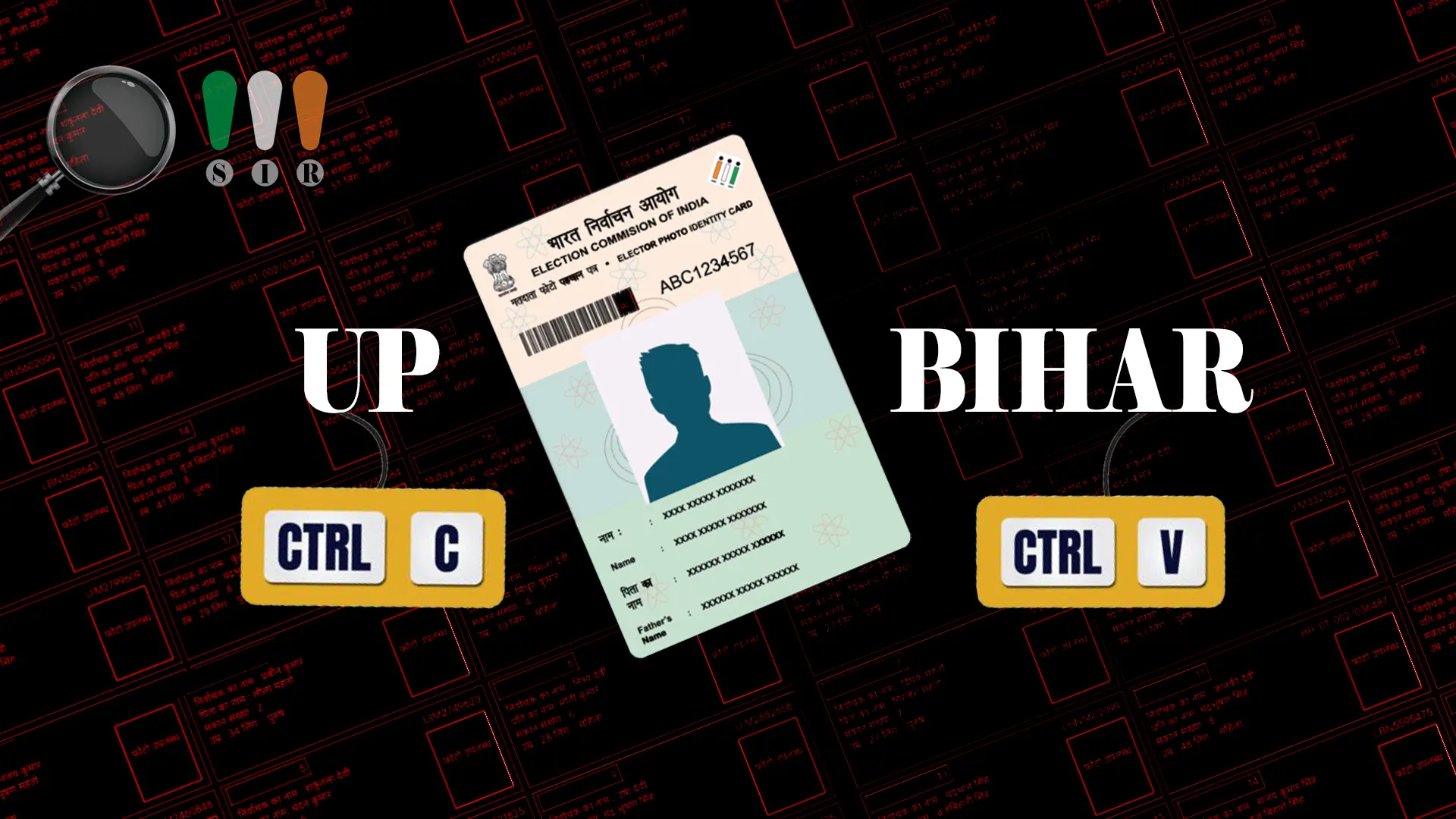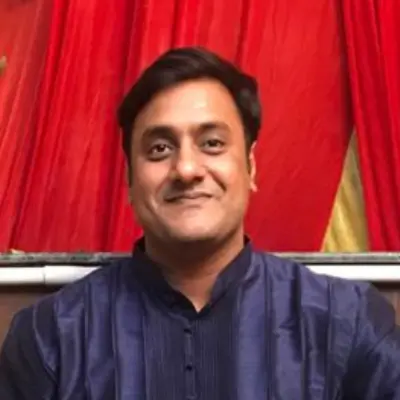
New Delhi: Thousands of people with existing voting cards in Uttar Pradesh have been illegally listed on the Election Commission of India’s (ECI) freshly-prepared draft electoral roll of just one Bihar assembly constituency, Valmikinagar, an investigation by The Reporters’ Collective has unearthed.
We found more than 1,000 voters from Uttar Pradesh to be illegally listed as voters on the new list of Bihar’s Valmikinagar constituency, with exactly the same details recorded in both state lists. Additionally, we have found thousands more who are listed on the new Bihar electoral list and in UP with minor alterations in their details. These add up to more than 5,000 dubious, bogus, or double voters. We detected that all of them hold two different Electoral Photo Identity Card (EPIC) numbers in the two states. This is illegal and leads to fake or wrongful votes being cast.
It is illegal for a legitimate voter of the country to hold two EPIC numbers. ECI is required to generate and provide a unique EPIC number to each legitimate voter only after scrutiny of their records.
For more than 1,000 cases, we found perfect matches: Names of the voter, their ages and their listed relatives (a mandatory field in the ECI database) were exactly the same across the databases of the two states. Only, their addresses were different.
In thousands of other cases, the voter’s name or that of the relatives had been changed by altering 1-3 letters in the spelling. In some cases, ages had been altered by 1-4 years across the two databases and the rest of the credentials matched.
These are results of an investigation carried out by The Reporters’ Collective with the help of data analysts to check the integrity of the new Bihar draft voter list. We started with Valmikinagar, one of Bihar’s 243 assembly constituencies that are scheduled to go for elections later this year in October-November.
Our findings from Valmikinagar raise serious doubts about ECI’s claim that the unprecedented special intensive revision has been devised and carried out to cleanse Bihar’s electoral roll of existing problems, such as migration and illegal migrants.
Whether these thousands of double and dubious voters on Uttar Pradesh’s electoral roll and Bihar’s new list are real people illegally holding two voter identities, or are they entirely bogus? Have they come on the Bihar voter list afresh, or have they existed from earlier years, and the ECI has failed to have them removed this time around?
The answer to these questions requires extensive on-ground inspection and verification. The kind ECI had said it was conducting with the Special Intensive Revision (SIR). But, our investigation has shown that dubious and double voters exist on a large scale in the new draft list of Bihar, despite ECI’s assurances to the contrary to the Supreme Court and citizens.
We sent written queries to the ECI headquarters in Delhi and its Bihar office. Neither of them responded. The public relations officer of ECI, Ashok Goyal, on phone, said, “You must keep in mind that whatever discrepancies are there, the claims and objections period is still on.”
The officer is correct. This is a draft list.
But, our analysis of the ECI’s ongoing processes also shows weeding out such dubious voters from Valmikinagar and other Bihar constituencies to finalise the voter lists is now going to be logistically difficult, if not impossible, to conclude before the assembly elections.
A majority of names on the new draft voter list are without supporting documents. Now the bogus, fake and double voters, going by ECI regulations, are required to go to district officials to get their names removed from the final list, and the legitimate ones may or may not be required to prove their credentials to stay on it over a 30-day sprint exercise that the ECI has ordered.
To Catch the Dubious
On June 24, the ECI ordered a complete overhaul of the Bihar voter list in a short period of 90 days, linking it to the upcoming assembly elections. It claimed the unprecedented exercise was being undertaken to scrub the list clean of any discrepancies, including dead voters, duplicate voters, ‘illegal immigrants’, or voters who have migrated away.
We reported how the process itself had been set up on questionable principles and grounds, including ECI’s claim that it would verify each voter’s citizenship. The ECI initially required its booth-level officials to collect forms and documentary proof of people’s citizenship, identity, and place of stay after verifying them within a 30-day period.
But facing a backlash on the ground, within days of the exercise commencing, it switched gears and said enumeration forms could be collected without evidence. The citizens could provide those later over another 30-day window. Then it changed tack again, and sowed confusion. It said once people had been put on the draft lists, their names would not be struck off by district-level officials without a case-by-case detailed review - even if they had not submitted their records.
On August 1, the ECI put out the new draft list of Bihar voters.
The Reporters’ Collective collaborated with a team of independent data analysts to study Bihar’s latest draft voter list. The ECI has made it hard to scrutinise the authenticity of these lists by recently replacing the online digital versions with scanned copies that are hard to machine-read and analyse using computers.
Our analysts breached the wall ECI has built to prevent such scrutiny. They converted the scanned copies to data that can be read for each character in the specific Hindi font that the ECI uses.
They began the task with Valmikinagar because sources from the ground had pointed to such dubious voters making it to the constituency’s list. Valmikinagar in Bihar shares its boundaries with three constituencies of Uttar Pradesh, Siswa, Padruana, and Khadda. They scanned for each voter from the Valmikinagar (Bihar) list on the voter list of the three UP constituencies.
They first looked for a 100% match and found hundreds. The name of the voter, the name of the relative named, and the age, all three were the same, and only the addresses differed.
For example, consider a voter, Chhedi Ram, on the Valmikinagar list. His Bihar details show him aged 45. His relative is named Sukhl Ram, and his EPIC number is UIM3397304.
Across the state boundary, in Uttar Pradesh, a Chhedi Ram, also aged 45, with a relative also named Sukhl Ram exists on the voter database. He has a different EPIC number (TWZ3526795), and he is registered to vote in the Khadda assembly constituency of Uttar Pradesh.
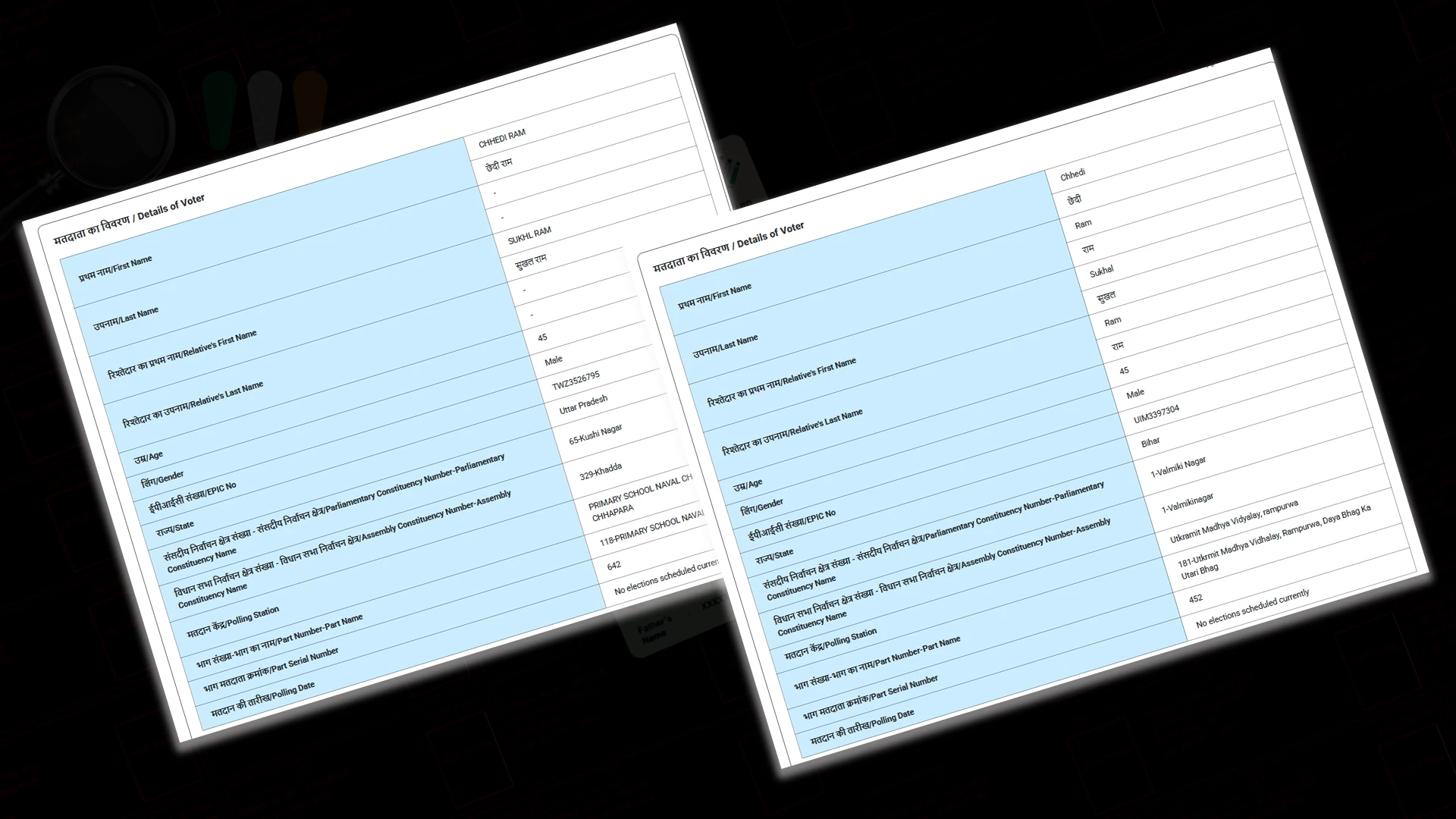
The hundreds of dubious voters in a Bihar assembly election can make or break the chances of a candidate. This should have been enough to raise an alarm. But, noticing another pattern, they went a step ahead.
They tweaked their program to also detect and match voters in the Bihar constituency’s database with Uttar Pradesh’s, with a strict 1-3 alphabet changes in the names and 1-4 years difference in the age, where other parameters matched. This brought out thousands of cases of dubious voters on the Valmikinagar list who were classified for the range of matches detected.
Take the case of Shabanam Khatun. According to the ECI voter database, she is registered to vote in the Siswa constituency of UP’s Maharajganj district with an EPIC number NDL1943968. Her relative’s name is listed as Isteyak Ahmed, and her age is 33. In Bihar, a duplicate registration for “Shabnam” exists with slight changes in her first and last name. "Khatun" becomes "Khatoon," her relative’s name is spelt "Ishteyak Ahmed," and her age is listed as 34.
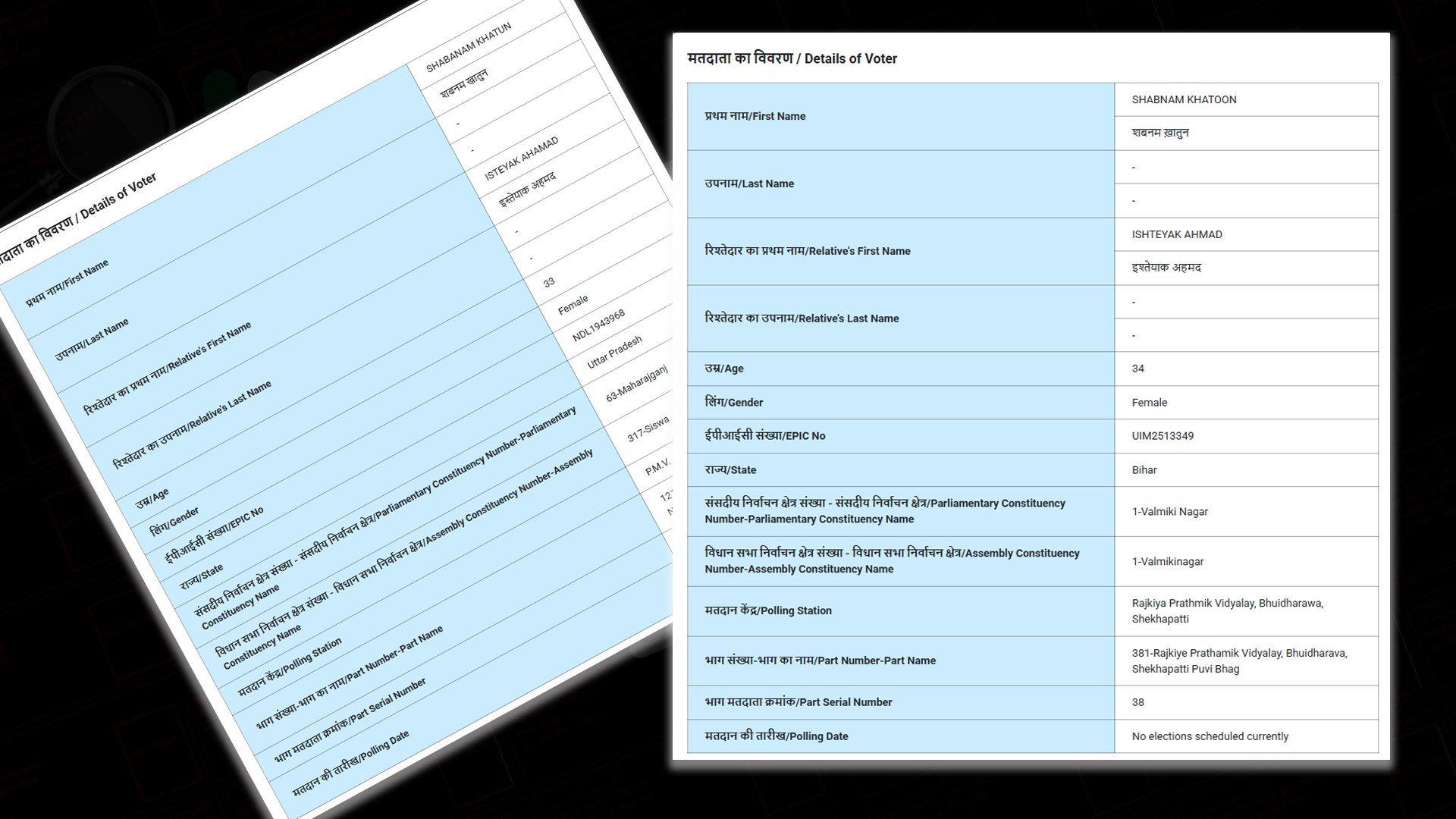
Consider another case. Ramnarain Yadav, whose father’s name is listed as Mohit Yadav and age as 39, is registered to vote in the Padruana constituency of UP’s Kushinagar district. “Ramnarayan” is also registered to vote in the Valmikinagar constituency of Bihar’s Pashchim Champaran district, where his father’s name is listed as Mohit Yadav and his age is 38.
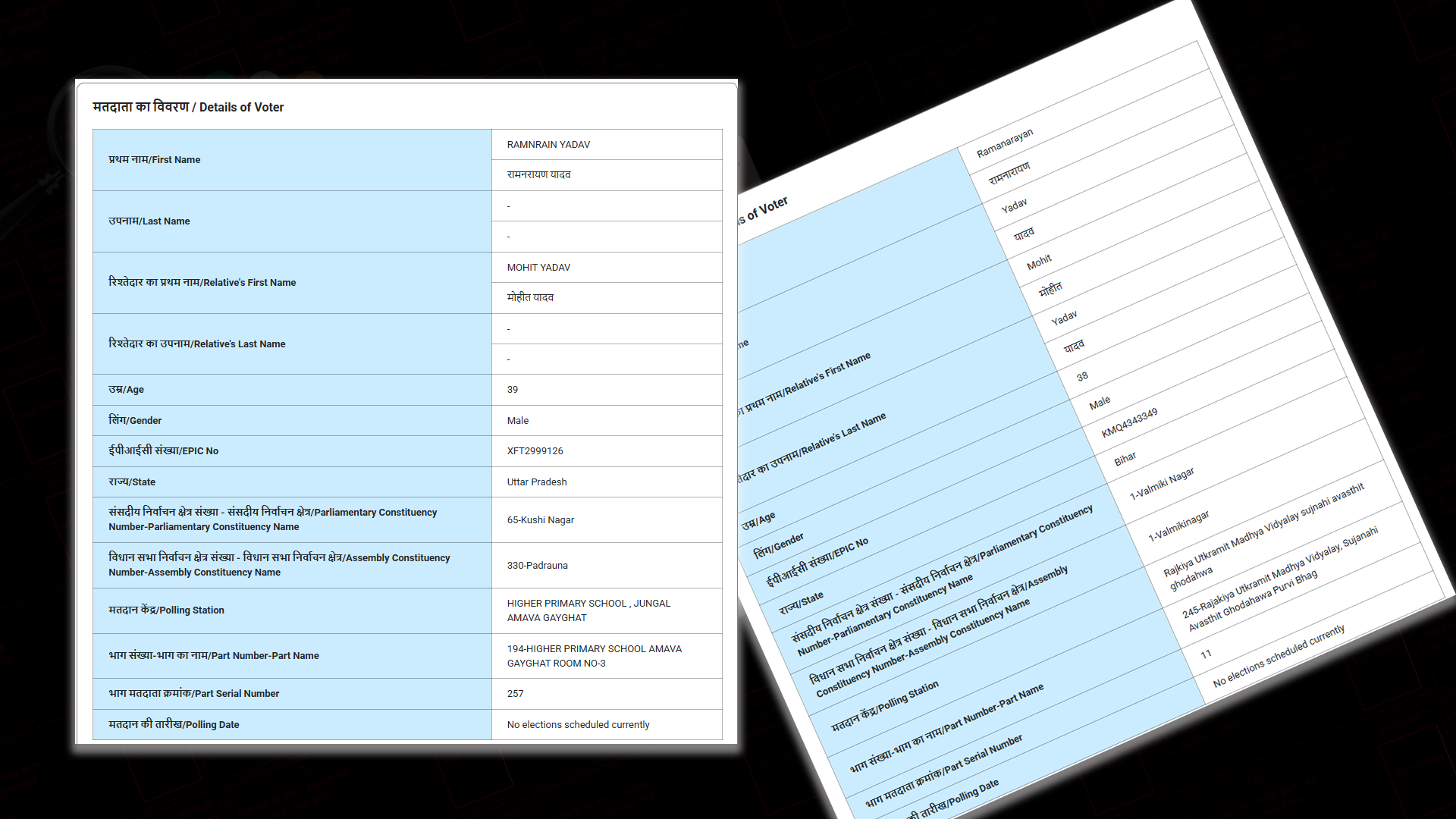
Sometimes, the deviations encompass multiple syllables. In the Khadda constituency of Kushinagar district, a 40-year-old individual named Hiralal Kushwaha, whose father is Feku Kushwaha, is registered to vote. In Valmikinagar, the name becomes Hiraman Kushavaha, and the father’s name becomes Feku “Kushavaha”, and the age is listed as 40 years old.
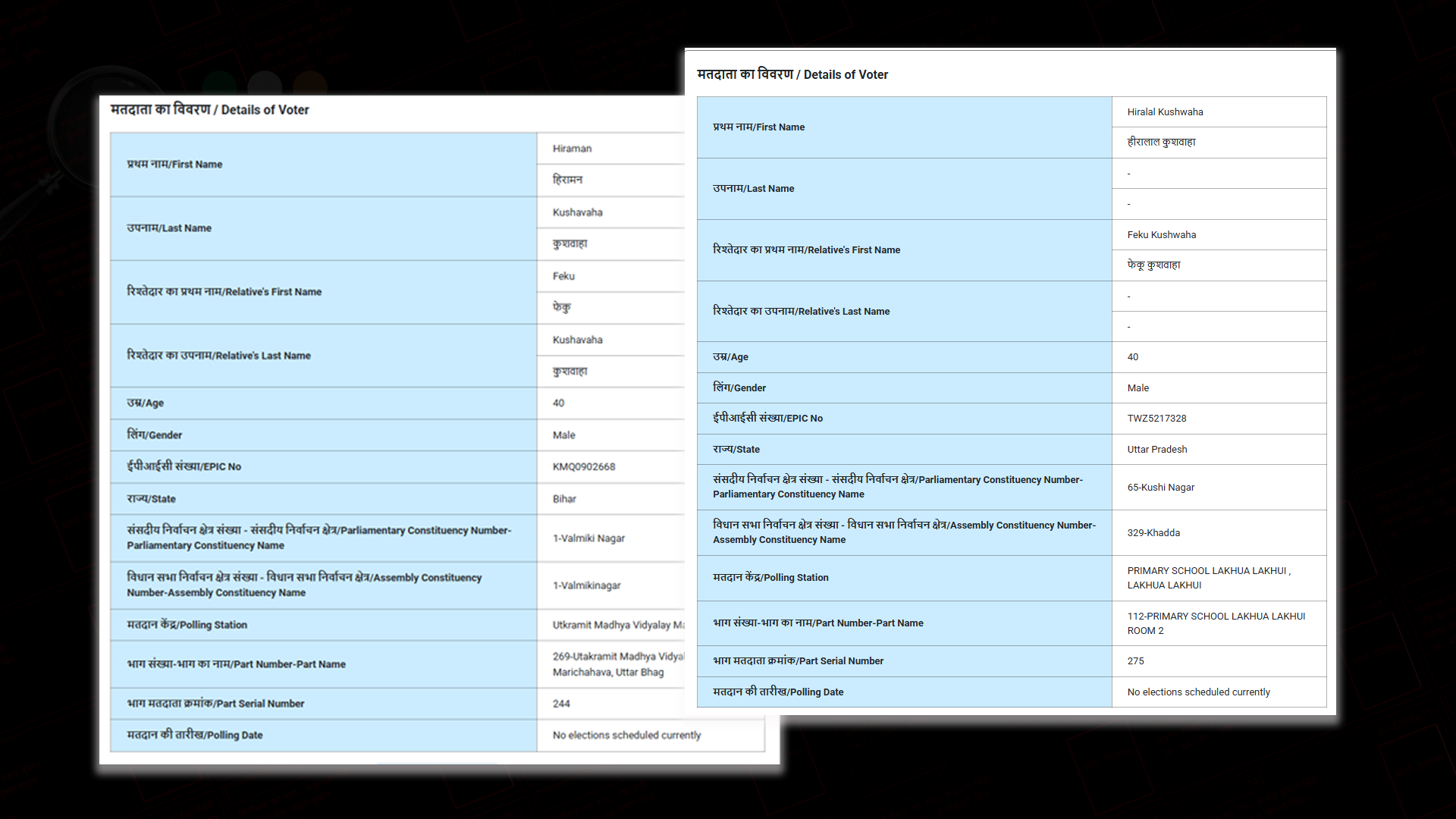
The Collective’s team of reporters then test-checked the list of dubious, double, or bogus voters generated by the data analysts. We manually checked the data by feeding the dual EPIC numbers in the respective state’s list for hundreds of randomly selected cases. The details in different fields were compared.
We found the list of complete matches across three parameters to be 85% accurate. The list of double EPIC numbers with 1-2 alphabet alterations in the data was also 85% accurate. The list with 2-3 alphabet deviations is 70% accurate.
Why the Dubious Voters Can't be Explained Away
Border districts of Bihar and Uttar Pradesh see plenty of cross-migration for work and marriages. There is always a likelihood that a legitimate voter from Bihar has moved to Uttar Pradesh, temporarily or permanently. The movement can be the other way around, too.
But, by law, if a person moves to another state and gets his or her voter registration done in the new place of stay, the ECI is required to delete the record in the previous place and ensure the person has only one EPIC number for the new address.
It is fairly possible that cases of double registration have existed in Bihar before the SIR. Some or many of the ones we detected could be of this nature. But the ECI claims the new exercise was done with never-before-accuracy, scale, and technology, so it will improve the Bihar database.
Reportage by many journalists during the period of data collection showed chaos struck the exercise early. Booth-level officials, facing the ire of people and then following the changed instructions of ECI, began filling and collecting enumeration forms without the supporting documents. The people on the recently finalised 2025 January list were automatically populated on the new draft list of August if the booth-level official had submitted their enumeration forms.
Therefore, the first and most important stage of the roll revision to identify and remove migrants, fakes, and double voters was lost when forms of over 9.16 crore electors were collected in a one-month period. A majority of these were submitted without documentary proof.
In the ongoing phase of review, the ECI has changed the rules to say, “The ERO/AERO shall not delete any entry from the draft roll without conducting an inquiry and giving a fair and reasonable opportunity to the persons concerned whose name has appeared in the draft roll.” Millions now exist on the draft list without having ever provided documentary proof as originally the ECI claimed they would have to.
Why would a person who has willingly obtained two voter cards illegally, now want to appear before an official and get his Bihar one removed? Why would a bogus voter of Bihar, who has been added on the draft list, come before an official to want his or her name deleted? Once they made it to the draft, they are likely to remain on the final one as well.
“The ECI has landed in a mess of its own making,” a retired Election Commissioner said to The Collective, on the condition that he would not be named.
“Voter lists are bound to have some errors. These errors could have been removed to a greater degree, if the SIR had been conducted over a reasonable period of time. In Bihar, district officials are now required to verify records of crores of people in just 30 days and pass written orders in each case that they remove a person. It's a quasi-judicial process. Or, their other option is to just let the lists be. You can imagine how this will go,” he added.
The Reporters’ Collective will continue to track what happens to the fate of these 5,000 plus dubious and duplicate registered voters as the ECI completes its special intensive revision of the voter roll in Bihar.


.avif)


